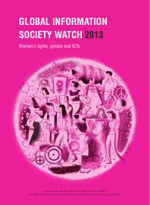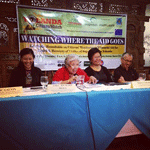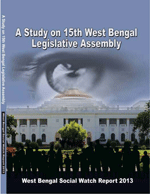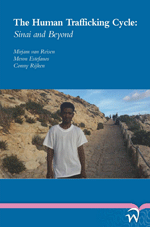Published on Wed, 2013-12-11 23:12
In a report to the UN General Assembly, a UN rights expert has emphasised that poverty is closely associated with racism and contributes to the persistence of racist attitudes and practices which in turn generate more poverty. Racial or ethnic minorities are disproportionately affected by poverty; and the lack of education, adequate housing and health care transmits poverty from generation to generation, a United Nations rights expert has said. According to Ruteere, poverty does not result only from an unequal sharing of resources. 'Discrimination against groups and persons based on their ethnicity, race, religion or other characteristics or factors has been known to encourage exclusion and impoverish certain groups of the population who suffer from unequal access to basic needs and services.' |
Published on Wed, 2013-12-11 22:06
The Global Information Society Watch 2013 shows that gains in women’s rights made online are not always certain or stable. While access to the internet for women has increased their participation in the social, economic and governance spheres, there is there is another side to these opportunities: online harassment, cyberstalking, and violence against women online all of which are on the increase globally. This GISWatch is a call to action, to the increased participation of women in all forms of technological governance and development, and to a reaffirmation and strengthening of their rights online. |
Published on Thu, 2013-12-05 23:11
Three days into the first month since super Typhoon Yolanda flattened many parts of central Philippines, media groups, netizens, and disaster risk reduction advocates come together to talk on steps to ensure that the funds and goods donated for Yolanda victims will be accounted for and will match of the needs of about 11 million people it affected. More than tracking where foreign aid goes as the country continues to recover from Typhoon Yolanda (Haiyan), citizens need to keep an eye on how government’s calamity funds are spent, Dr. Leonor Briones, lead convenor of Social Watch Philippines advised civil society organizations on December 4th. |
Published on Thu, 2013-12-05 14:55
West Bengal Social Watch releases a Citizen’s Report on the performances of the 15TH West Bengal State Legislative Assembly till date. West Bengal Social Watch organized a ‘Discussion Meet on Current State of Affairs vis-à-vis Role of Citizens’ on November 30, 2013. Shri Chittotosh Mukherjee, former Chief Justice of Kolkata & Mumbai High Courts participated in the Press Conference hold on November 30, 2013. |
Published on Thu, 2013-12-05 14:49
The report "The Human Trafficking Cycle: Sinai and Beyond is based on the graphic testimonies of refugees from the Horn of Africa, the vast majority being Eritrean, who have been through the torture camps of Sinai. It is estimated that between 25,000 and 30,000 refugees have been held as hostages in Sinai, of whom many have died or disappeared. That total value of the entire Sinai Trafficking cycle is calculated to be of the order of 600 million USD. The Human Trafficking Cycle: Sinai and Beyond shows that for the survivors of Sinai the challenges do not end when they are released, but continue as most remain trapped in situations of insecurity and without the support they need to recover from the physical and psychological trauma of their experiences. |
SUSCRIBE TO OUR NEWSLETTER







